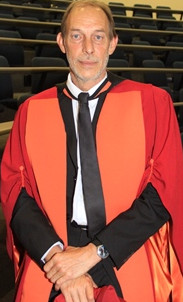
Delivering his inaugural lecture last week on Wednesday (16 October), Head of the Department of English, Professor Dirk Klopper spoke about the emergence of the imaginary in the space of the interval; the space among the actualities of everyday life, the space of possibilities, filled with potentiality.
He first noted that the word inaugural came from augur, or foretelling. He said while no-one could truly read the future he had, he cherished the space for academic endeavour with which Rhodes University had provided him.
Loss. Poverty. Pacification. Bare Life. Reading. These were the areas he focused on and informed the audience gathered at Eden Grove Lecture Theatre, which he intended to cover in his talk entitled Poverty, Bare Life and the Life of the Imaginary.
With the use of evocative black and white photographs, and quotations from the works of some of South Africa’s most well-known authors, he took his audience on a journey where he asked them to distinguish between poverty and destitution, and to explore with him ways in which poverty could be re-visioned, without either idealising or trivialising the hardships faced by those living within it.
He was at pains to emphasise that poor communities both require and deserve the fulfilment of basic human needs such as shelter and food. However, he explained, he wanted to move beyond the tangible into the not-quite, a different way of being.
Using JM Coetzee’s novel Disgrace as an example, he suggested that the imaginary could be used to think into the ways of poverty, and from there to think of poverty as a conceptual clearing from which a different understanding and inhabitation of the world might emerge.
Moving on to Zakes Mda’s novel The Heart of Redness, Prof Klopper used a powerful quote to illustrate the principle of pacification; something which, ironically, the isiXhosa accomplished for the colonial powers by the cattle killings of the 19th century in response to the words of the prophet Nonqawuse.
This belief in the words of a young girl, who claimed to have spoken to the ancestors, resulted in widespread starvation and mass exodus from Xhosaland to take up employment in the Cape Colony, breaking the resistance of the amaXhosa to colonial rule and severing them from their pastoral way of life.
This pacification resulted, Prof Klopper said, in a previously external political border between the colony and the other being made internal, incorporating the amaXhosa into the law of the colonial power while simultaneously setting them apart from that law.
Touching on Heidegger, Foucault, Marx and Freud, Prof Klopper’s exploration of natural life versus political life, the dynamics of inclusion and exclusion, and the privations of poverty as opposed to the imaginary space of a conceptual clearing in order to think differently, made for a fascinating and thought-provoking talk.
Finishing with a quotation from the Don MacLennan poem ‘The Poetry Lesson’ he mused on a moment of mutual ignorance, which creates the space for a creative spark of imagination to fire and flourish.
By Jeannie Wallace McKeown
Professor Dirk Klopper Inaugural Lecture: Introduction by Vice-Chancellor
